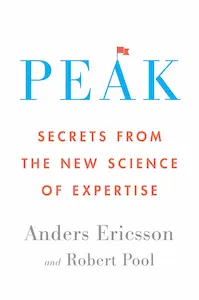Peak - Summary
K. Anders Ericsson and Robert Pool

Introduction
In the book “Peak: Secrets from the New Science of Expertise” by K. Anders Ericsson and Robert Pool, the authors delve into the concept of deliberate practice and its role in achieving exceptional performance in any field. Drawing upon decades of research, Ericsson and Pool challenge the notion that talent alone determines success and instead argue that deliberate practice, a specific type of focused and purposeful training, is the key to unlocking one’s full potential. This book summary will provide an overview of the key concepts explored in “Peak,” highlighting examples and anecdotes from the book to illustrate its central arguments.
The Myth of Innate Talent
Ericsson and Pool begin by debunking the myth that innate talent is the primary factor behind exceptional performance. They emphasize that while genetics and initial aptitude may provide a starting point, it is deliberate practice that ultimately determines the level of expertise one can achieve. The authors cite numerous studies, including their own research on accomplished individuals in various fields, to support this claim.
The Power of Deliberate Practice
Deliberate practice is defined as a highly structured and purposeful form of training that focuses on improving specific aspects of performance. It involves setting clear goals, receiving immediate and informative feedback, and pushing oneself beyond the comfort zone. Ericsson and Pool argue that deliberate practice is not only physically demanding but also mentally challenging, requiring intense concentration and effort.
The Role of Expert Coaches
One crucial aspect of deliberate practice highlighted in the book is the role of expert coaches. Ericsson and Pool emphasize that effective coaches possess deep domain knowledge and are skilled at providing targeted feedback. They share the example of Benjamin Franklin, who sought the guidance of a mentor to improve his writing skills. The authors argue that expert coaches play a vital role in guiding individuals through the complexities of deliberate practice, helping them identify weaknesses and providing strategies for improvement.
The Importance of Feedback
Feedback is a fundamental component of deliberate practice. Ericsson and Pool stress the significance of immediate and informative feedback in the learning process. They discuss the case of chess grandmasters who analyze their games with the help of computer programs, allowing them to identify mistakes and refine their strategies. The authors assert that feedback not only helps individuals correct errors but also provides a roadmap for continuous improvement.
The Role of Mental Representations
Mental representations, or internalized mental models, play a crucial role in deliberate practice. Ericsson and Pool explain that experts in various fields develop highly detailed and accurate mental representations, enabling them to anticipate and respond effectively to different situations. They illustrate this concept through examples such as musicians mentally rehearsing complex pieces and athletes visualizing specific movements. The authors argue that cultivating accurate mental representations is essential for achieving expertise.
The Limits of Deliberate Practice
While deliberate practice is hailed as the key to expertise, Ericsson and Pool acknowledge that it has its limitations. They discuss the concept of “domain-specificity,” highlighting that deliberate practice is most effective within a specific domain or field. The authors caution against applying the principles of deliberate practice to unrelated areas, as the skills and mental representations developed may not transfer effectively.
The Role of Motivation and Grit
Motivation and grit are essential factors in sustaining deliberate practice over an extended period. Ericsson and Pool emphasize that the journey towards expertise is often long and arduous, requiring immense dedication and perseverance. They share anecdotes of renowned individuals, such as Mozart and Tiger Woods, who displayed exceptional motivation and resilience in their pursuit of excellence. The authors argue that maintaining intrinsic motivation and developing grit are critical for overcoming challenges and setbacks along the path to expertise.
The 10,000-Hour Rule
One of the most popular concepts discussed in “Peak” is the 10,000-hour rule. Ericsson and Pool explain that extensive research has shown that around 10,000 hours of deliberate practice is often required to achieve expert-level performance in various domains. However, they caution against viewing this as a fixed rule, as the quality and intensity of practice are equally important. The authors emphasize that deliberate practice, rather than the sheer number of hours, is the true determinant of expertise.
The Importance of Mindset
Ericsson and Pool emphasize the significance of having a growth mindset when engaging in deliberate practice. They argue that individuals who believe in the capacity for improvement and view challenges as opportunities for growth are more likely to persevere and excel. The authors discuss the work of psychologist Carol Dweck, who coined the terms “fixed mindset” and “growth mindset.” They highlight the importance of cultivating a growth mindset to fully harness the benefits of deliberate practice.
Applying Deliberate Practice in Education and Beyond
In the final sections of the book, Ericsson and Pool explore the application of deliberate practice in various contexts, including education, sports, and professional development. They discuss how deliberate practice can be integrated into classroom settings to enhance learning outcomes and challenge traditional notions of talent. The authors also emphasize the potential for deliberate practice to revolutionize training programs in fields such as medicine and business, enabling individuals to continuously improve their performance.
Conclusion
“Peak: Secrets from the New Science of Expertise” by K. Anders Ericsson and Robert Pool challenges conventional wisdom regarding talent and expertise. Through extensive research and compelling examples, the authors argue that deliberate practice is the key to unlocking exceptional performance in any field. By setting clear goals, seeking expert guidance, embracing feedback, and maintaining motivation, individuals can embark on a path of continuous improvement and reach new heights of achievement. “Peak” offers valuable insights and practical strategies for anyone seeking to unleash their full potential and pursue mastery in their chosen domain.